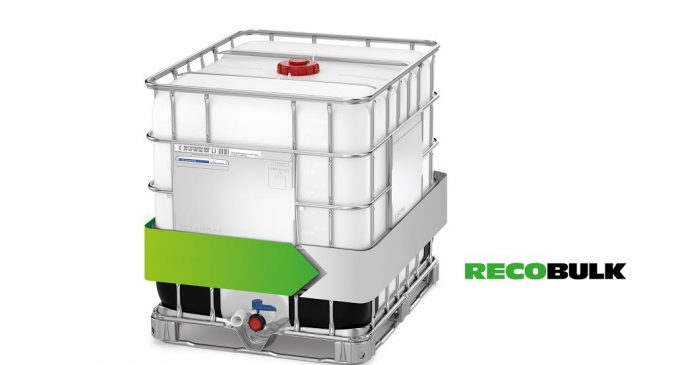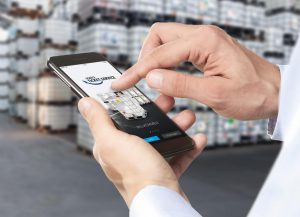Using Reco Without Risk – Schütz’s IBC System is the Answer

Once they have been used, transport containers re-enter the market after treatment with several different processes that range from simple cleaning to complex reconditioning. When it comes to reusing IBCs many different factors need to be taken into consideration. The most important are what product the IBC was previously filled with, what the IBC is to be used for and which tests and labels are legally required.

Reconditioning with the Schütz Ticket Service – a recycling system that saves valuable resources and eliminates the risk of contamination by residues.
Conserve resources by recycling: the principle of the system launched in the 1990s in Germany with the Dual System “The Green Dot” for used consumer packaging is still as relevant as ever. Reuse and recycle also plays a major role for industrial transport packaging and is often a driving force for innovations. For instance, over 30 years ago, Schütz developed its own recycling system, called the Schütz Ticket Service. This system has grown ever since and is now the largest manufacturer-operated global network for the collection and reconditioning of empty IBCs. Using identical high standards all over the world, the Ecobulk is turned into a 100-per-cent compatible Recobulk in the standard specification. The recently introduced brand name clearly communicates the fact that regardless of which of the two IBC types a customer uses, they receive packaging in the same original quality including a new UN approval. This is a clear statement, because the term reconditioning is frequently used to mean completely different things in the industry, including, for example, cleaning, repairs, recycling. However, in reality these are merely stages in the reconditioning process.
In accordance with ADR, reconditioned packaging must fulfil the same specifications and pass the same tests as the original new packaging. Strictly speaking, the term reconditioning refers only to metal and plastic drums and jerry cans. Regardless of whether the product in question is a drum or an IBC, the aim is to remove all traces of the previous contents and to restore the packaging to its original functionality in accordance with the approved model.
Cleaning and Repair – Simple, but are they sufficient?
The simplest level is cleaning, also referred to as regular maintenance. This process generally starts with an incoming goods inspection. Any product residues are suctioned out and disposed of externally. The container is treated with a pressure cleaner and then the inner bottle is cleaned – usually with an aqueous caustic soda solution. Any remaining labels are removed and all caps and gaskets are replaced. The container is dried and then checked with hot air to ensure it is leakproof. Finally, the interior and exterior appearances are visually inspected.
Cleaning is a simple and relatively cheap process, but it is only a safe alternative to other methods if the IBC is being filled with the same product. Responsibility for this lies with the filler. The risk of contamination by residues or residual moisture, both of which can impact negatively on the subsequent filling product, can never be ruled out completely through cleaning. There is also the danger that the product has already permeated into the inner bottle, which can mean that the plastic accumulates a large quantity of contaminants after only a few cycles. This change is invisible to the bare eye and cannot be reversed by cleaning. A particular filling product can also act as a solvent for the previous product, presenting a permanent risk of contamination. Also, considerable quantities of water are needed for cleaning, which has a negative impact on the environment; additionally, disposing of contaminated washing water also has a high hazard potential.
Another, usually more complex and time-consuming process for reconditioning IBCs is to repair them, also known in the market as rebottling. Here, after incoming inspection, the IBC is repaired so that it successfully passes the type test again. This usually involves replacing the inner bottle with a new one with the same specifications. The container is checked to ensure it is leaktight and the overall condition is assessed. The advantage of this process is that the risk of contamination is ruled out because the inner bottle is replaced, thus protecting the quality of the filling product. However, the period for which the container can be used remains unchanged, as the validity is not extended if a new bottle is used.
“Customers who package sensitive products and for whom the highest safety and hygiene standards are important should always replace the inner bottle rather than just cleaning the container,” says Andreas Wolf, Manager Reconditioning Services & Sales EMEA, Schütz GmbH & Co. KGaA. “That is why we recondition our IBCs.”
Schütz Ticket Service – From Ecobulk to Recobulk
Reconditioning under the terms of the Schütz Ticket Service takes place in accordance with uniform global environmental, safety and quality management standards in state-of-the-art, certified lines. Collected Ecobulks are first assessed according to the last filling product they were used for on the basis of an internal filling product database. The correct handling method is determined using the appropriate material safety data sheet. Then the inner bottle is removed from the steel grid, opened and any remaining product residue is removed and disposed of separately. The plastic components that have been removed are all recycled internally and used to make new parts, for example plastic skids. The container receives a completely new inner bottle. Components such as screw caps, outlet valves and label plates are replaced with new original parts. Only the robust steel grid and the bottom plate are repaired if necessary and are reused. The container is submerged in water to ensure that it is leaktight. Schütz always conducts 100% tests, i.e. all parts of a production batch are tested.

The Schütz Recobulk has the same standard specifications as the Ecobulk – both containers are 100 per cent compatible.
In order to completely rule out any potential risks that could result from the parallel use of new and used packaging, reconditioned Schütz IBCs offer precisely the same high level of safety as new ones. Ecobulk and Recobulk are available in exactly the same standard specification. Andreas Wolf explains: “This close link is represented by the new brand name Recobulk for reconditioned containers. From the very beginning, reconditioning to achieve the original quality was an integral part of Schütz’s packaging system. Our customers benefit from this system’s flexibility, dependability and sustainability.” A further great advantage is the fact that the production of each new Recobulk saves around 100 kilograms of CO2 emissions compared with a new IBC.
A Long Tradition of Reconditioning
Schütz has long-established expertise in reconditioning: as a pioneer in the industry, the company first started reconditioning in 1976 and, as the first manufacturer, has guaranteed the collection of used containers since 1980. The basis for the administration-free process is a constantly expanding logistics network, which currently includes 47 production and service sites. This guarantees short transport routes and constant supply security. In order to make collections as easy for customers as possible, they can now also use a specially developed app, in addition to ordering collections by fax, email, telephone and online.



































